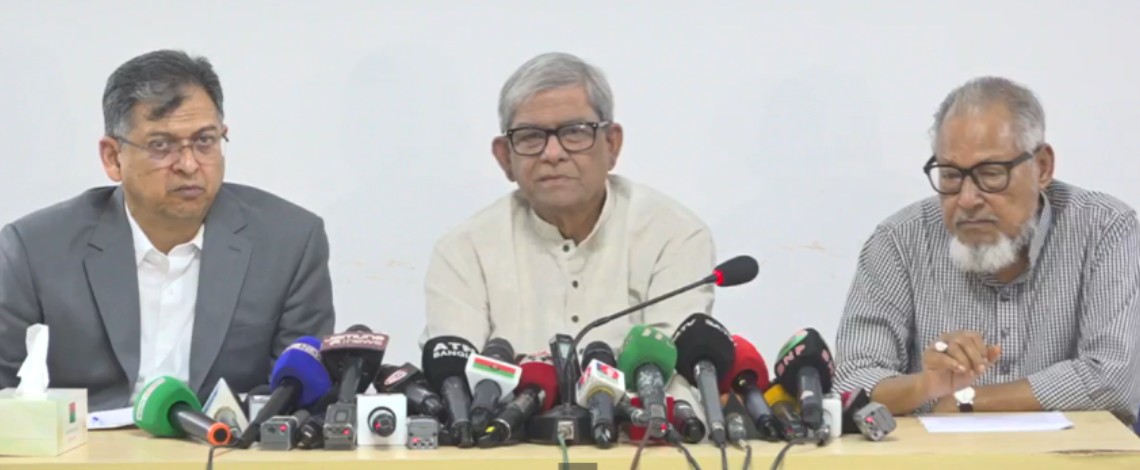BNP Secretary General Mirza Fakhrul Islam Alamgir has expressed cautious optimism about the ongoing activities of the National Consensus Commission, saying that while the public’s interest and expectations are high, so too are their worries and frustrations.
Fakhrul was speaking at a press conference at the BNP Chairperson’s political office in Gulshan on Sunday morning.Fakhrul highlighted both the progress and challenges centering the national reform efforts. He explained BNP’s official position on several key issues.
Fakhrul criticized the introduction of new reform proposals that were not part of the original discussions. He warned that many of these suggestions could significantly affect the political system, state governance, and parliamentary functions. The BNP leader said positive reforms would be welcomed by the public. But he cautioned that meaningful changes must include public participation. “The people are the true owners of the state, and making major changes without their involvement raises serious concerns about legitimacy,” he said. Fakhrul added that because there has been no clear proposal for discussion, BNP is withholding detailed comments for now.
Underscoring BNP’s resilience and unity in the face of political repression, Fakhrul said the party has not only survived nearly two decades of struggle against authoritarian rule but has grown stronger. “The sacrifices of our martyrs, the pain endured by the families of those who were disappeared or killed, and the immense suffering of our activists have only deepened BNP’s unity and resolve,” he said. He also warned against concentrating too much power in any individual or institution, noting that doing so invites fascism. Similarly, he argued that weakening elected governments and parliaments could render the state ineffective and dysfunctional.
Fakhrul emphasized that BNP has participated actively in all six reform commissions and continues to engage daily in the activities of the Consensus Commission. According to him, BNP representatives have contributed constructively by building consensus with other political parties and offering compromises where necessary to move discussions forward. However, he noted that delays have occurred because new and often conflicting proposals have been introduced after lengthy discussions had already taken place in the reform commissions.
Detailing BNP’s positions on various reform areas, Fakhrul said the party supports most of the proposals but has reservations on specific points. On police reform, formal discussions have yet to begin, but according to BNP representatives, broad consensus has been reached on major issues, including the disbandment of the Rapid Action Battalion (RAB). Regarding anti-corruption reforms, BNP agreed to 46 out of 47 proposals, disagreeing only with a recommendation to bypass court approval for certain procedures, which the party believes could unnecessarily delay the Anti-Corruption Commission’s operations.
In public administration reform, BNP agreed with 187 of 208 proposals, partially supported five, and opposed 11—mainly concerning the creation of new provinces and issues related to promotions and administrative inconsistencies. On judicial reform, BNP supported 62 of 89 recommendations, partially supported nine, and opposed 18, while offering detailed counterarguments. The party backed all proposals concerning judicial independence but acknowledged that some would require constitutional amendments or parliamentary ratification.
Regarding electoral reform, Fakhrul said BNP agreed with 141 of the 243 recommendations, partially with 14, and conditionally with 64 others. The party opposed 24 proposals, arguing that some would undermine the constitutional independence of the Election Commission. Still, BNP agreed to all recommendations that would help ensure free, fair, and impartial elections.
On constitutional reforms, Fakhrul said BNP supported most of the 131 recommendations, even agreeing to compromises on critical issues such as Article 70 and limiting the Prime Minister’s term—despite such provisions not existing in most global democracies. The party also agreed to reforms related to the appointment of the Chief Justice, allowing opposition parties to chair key parliamentary standing committees, and amending Article 49 to revise presidential powers. BNP also supported proposals for reintroducing the caretaker government system, updating the Ombudsman law, redrawing electoral boundaries, and establishing permanent High Court benches in regional divisions, though the latter would require consultation with the judiciary due to a past Supreme Court ruling that invalidated a similar move.
Fakhrul concluded by saying some reform proposals, though agreed to in principle, may be difficult to implement and may not achieve their intended goals. Nevertheless, he said BNP remains committed to the process, offering well-reasoned and experience-based input. “Our support for the reforms is not an obstacle but rather a contribution to making the process meaningful and democratic,” he said.
His remarks come amid intensifying national debate over the transparency, inclusiveness, and direction of the reform initiatives. While BNP’s active engagement in the process underscores its willingness to seek compromise, the party continues to call for greater public involvement and constitutional accountability in shaping the country’s future.


